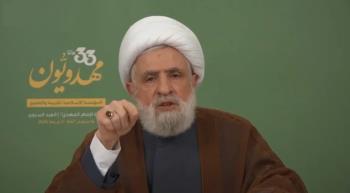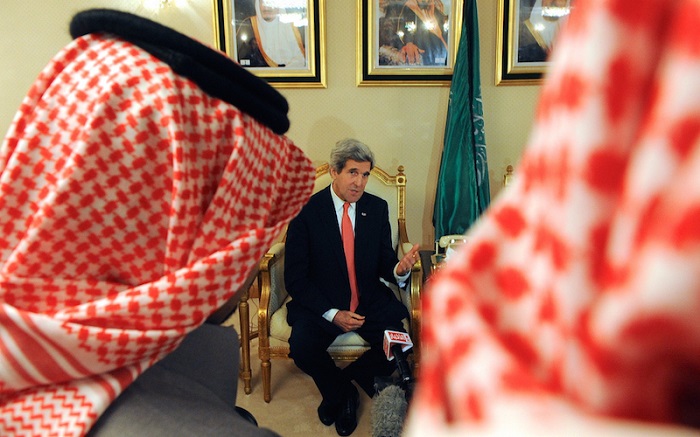Alwaght- The US and Saudi Arabia are considered as key international and regional players in West Asia region. A major part of the parameters and the regional strategic variables are shaped by an influence from the two countries' type of performance and acting as well as their way of dealing with the regional environment. Since the foundation of the kingdom of Saudi Arabia in 1932 and up to recent decades, the Washington-Riyadh ties have been strategic and firm. Many analysts label this friendship as an old “oil for security” equation.
Up to the 9/11 attacks in 2001, these bilateral relations were still standing. However, a collection of post-9/11 developments including introducing the Greater Middle East plan, counterterrorism policy, Iraq war, all started by the US government have triggered some changes in the stable Washington-Riyadh relations.
On the other side, the Arab uprisings of 2011 have stirred a new stage of tough competition and camping for holding sway among the regional countries and so led to a shift in the US role and view. Just like many other West Asian states, the kingdom had to very soon adjust its foreign policy with the fresh conditions. Fall of the former Egyptian President Hosni Mubarak in February 2011 as a result of the popular revolution has pushed Riyadh to openly criticize Washington for not supporting its old allies. Furthermore, influenced by the wave of post-2011 Arab uprisings, the people of Bahrain revolted against the ruling regime. Repression of the protests in Bahrain by the regime with a full and open physical backing of Saudi Arabia has drawn the American criticism.
Despite all these differences on some regional cases Washington and Riyadh were in full coordination about the political process in Yemen. The two allies still continue their counterterrorism cooperation. As part of this cooperation, the US built a combat and surveillance drone base on the Saudi soil in a bid to beef up its activities against the Al-Qaeda in the Arabian Peninsula (AQAP). The two countries also expanded their military cooperation as the Saudi arms purchases from the US hit a new record high, touching the $30 billion only in 2010.
But as the West Asian developments kept rolling on, two crucial differences set to rise between the US and Saudi Arabia. The first was connected to the developments in Egypt and removal of Mohamed Morsi, the first democratically-elected president of Egypt, by the army. On the eve of the first anniversary of President Morsi, the army pushed him out of power. Saudi Arabia firmly backed removal of Morsi and repression of Muslim Brotherhood, the Islamist movement from which Morsi became president. For the Saudis, the Muslim Brotherhood was an existential threat. The US, however, was against suppression of the Egyptian movement that has branches around the Arab world. Washington actually wants the course of developments be clear. The second sticking point is the Syrian case. Both of the US and Saudi Arabia want the Syrian President Bashar al-Assad out of power. But the kingdom is discontented with Washington for the latter’s unwillingness to intervene militarily to bring down the Syrian president. The American-Russian agreement for removing the Syrian chemical weapons was a kind of ending point for all of the US military plans against Damascus, an accord that sent Saudi Arabia in severe disappointment in its wishes for US-led military action to overthrow President Assad.
Another trouble-making point in the Saudi-American ties is the issue of relations with Iran. Tehran with its new president seeks building new relations with the West. The West has responded positively to this Iranian willingness. This new situation has made Riyadh seriously discontented and skeptical.
Amid this period of complicated changes in West Asia, Washington and Riyadh still share many stable and strategic interests in common, however. Although discovering new shale oil and gas resources have reduced the US dependence to the imported energy, Washington is still committed to West Asia region and no country can very soon take the US place in guaranteeing the strategic security of the Persian Gulf Arab states. So, Washington’s cooperation in the so-called counterterrorism field will continue with Riyadh. But how these two allies moves along the changing and developing course of cooperation together depends on political, social, economic, and even demographic issues each of them has ahead in the region and the world. Especially that the key points of difference of the two revolves around the sectarian tensions that push them to take conflicting stances in different crisis-hit countries. The best and most noticeable example is Syria. In the Syrian crisis Washington and Riyadh have different views on the developments, and particularly after Western decline to invade Syria not only the kingdom bristled at the US approach on Damascus but also a doubt was created in the eyes of Riyadh about the Washington’s capability to keep being a major player in West Asia. Afterwards, Saudi Arabia rejected UN Security Council seat in protest move, a step seen by the analysts as an effort by the kingdom to mark a point of change in relations with the US. Additionally, passing the JASTA Bill( Justice Against Sponsors of Terrorism Act) by the US Senate for Riyadh’s hands in the 9/11 attacks and the kingdom’s responding by threatening to withdraw its cash from the US economy have added to the range of disputes.
In fact, these developments were an outcome of the changes in the regional balance of power that fully transformed the political outlook of the West Asia. The developments can be focused on in four cases as follows:
- Taking key role in Arab and regional policy by the kingdom was an outcome of unipolarization of the international system after the 1990s, namely the time of collapse of the Soviet Union. Actually, alliance with the superior side of the international stage gave Riyadh the chance to direct the Arab world’s policies. But then the US’ unilateralism witnessed a decline, and Washington was immersed in troubles. In the recent decade everybody could apparently see the effects of this decline and other international changes on West Asia. The starting point was the September 11, 2011, namely the time of attacks against the US.
- The second issue has something to do with the Saudi Arabia’s peripheral environment. Saudi Arabia ended presence in Iraq as the new Saudi leaders rose to power. This will have very serious role in the future of the kingdom. At the same time, rise of new powerful players in Yemen, the southern neighbor of Saudi Arabia, showed that they can challenge Riyadh in the future. On the other side, Bahrain's insecurity and instability still continue. Therefore, the peripheral environment represents the weak spot of Saudi Arabia.
- Saudi Arabia is witnessing a gradual decline in its influence and presence in the region. For example, in the two cases of Syria and Lebanon the kingdom gradually steps back, and sees itself actionless in the face of the Axis of Resistance led by Iran. In Egypt fall of Mubarak and Morsi created some disputes with Turkey and Qatar. At the same time, Cairo, once an ally of Riyadh, moved closer to Damascus.
- Finally, the fourth outcome or strategic development is abatement in Iran-West tensions and consequently reduction of anti-Tehran pressures on which the Saudis counted so much to pursue their policies. The regional developments cracked the Saudi Arabian hegemony over the Persian Gulf Arab countries. This decline in prestige pushed them towards relations with Iran. The recent weeks saw such shift.
The fact is that the US and Saudi Arabia’s priorities in the region in recent times failed to match. This mismatch even intensified following the Arab uprisings. The differences, undoubtedly, always existed but the recent tensions have been unceasing and unprecedented, and they very likely will continue in the future. Meanwhile, Iran, the top opponent of Saudi Arabia, sees the Western gates open to it, and so the West ignores the Saudi-demanded regional camping.



























